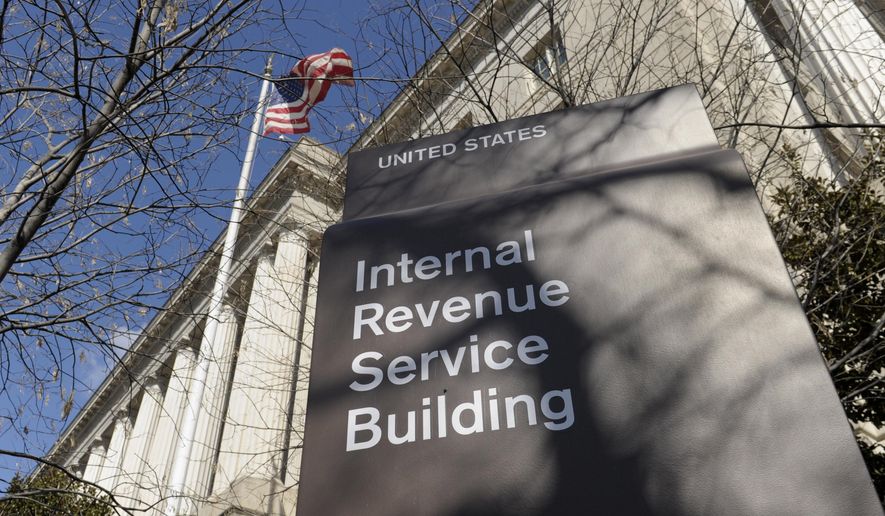A proposal to give the IRS access to all financial transactions above $600 is raising concerns among congressional Republicans about government overreach.
Democrats are pushing for regulations within President Biden’s $3.5 trillion, 10-year social welfare bill that would require banks to report annually on the “inflows and outflows” of personal and business accounts. The reporting requirement would cover any transaction above $600 or bank accounts with deposits totaling that sum. Some Democrats are also pushing for rules to cover mobile money transfer systems such as PayPal and Venmo.
Critics say the low reporting threshold would essentially give the IRS unfettered access to how ordinary Americans spend their money. Some Republican lawmakers say the expansion of federal powers would amount to a “surveillance state.”
“It feels a lot like communist China surveillance, doesn’t it?” said Sen. Bill Hagerty, Tennessee Republican and a former ambassador to Japan. “They’re going to insert themselves in every aspect of American lives. People don’t want this.”
Biden administration officials say the provision would help crack down on wealthy tax scofflaws and businesses that don’t report taxable income. They point to the “tax gap,” the difference between the amount owed to the federal government and the amount paid, as proof of the need for more financial reporting.
“There’s an enormous tax gap in the U.S., estimated at $7 trillion over the next 10 years,” Treasury Secretary Janet Yellen said last week. “And that’s not coming from people failing to report wage income or dividend income where there’s good information. It comes from places where the information on income is opaque and can be hidden.”
Democrats want to use Mr. Biden’s social spending bill to beef up IRS tax enforcement as one way to pay for other items on their wish list. Lawmakers are proposing an additional $79 billion overall for the agency to pursue tax cheats.
Republican lawmakers say the expanded enforcement and the $600 bank reporting requirement are likely to fall hardest on average Americans who cannot afford to wage legal fights with the IRS.
“Democrats want to spend [nearly] $80 billion so that federal tax authorities can expand their reach into the financial habits of average Americans snooping on transactions as small as $600,” said Senate Minority Leader Mitch McConnell, Kentucky Republican. “They want to finance their [$3.5 trillion] spending spree by effectively treating every ordinary American as if they were under an IRS audit.”
Democrats say such fears are overblown and average citizens will have nothing to fear from the $600 reporting requirement and a beefed-up IRS.
“It’s just a few pieces of information about individual bank accounts, nothing at the transaction level that would violate privacy,” Ms. Yellen said.
Private-sector banking interests disagree with that assessment.
“This new proposal would result in banks and credit unions turning over to the IRS sensitive account details that in and of themselves do not constitute taxable events,” the Credit Union National Association wrote in a letter to lawmakers last week. “This would leave the IRS with a massive trove of personal financial data that would be used in a manner that is not detailed in the proposal. This is risky and unnecessary.”
The American Bankers Association and other financial industry groups have logistical questions about how the reporting requirements would work.
“Despite assertions by some that a new reporting regime would be simple to execute and represent a low or even no-cost mechanism to help narrow the tax gap, designing system capabilities to capture account inflows and outflows and other information is complex, expensive, and will take years,” said ABA President Rob Nichols. “Having the raw data somewhere in a bank system does not mean it is easily compiled or produced to government specifications.”
Democrats pushing for the requirements are struggling to find ways to pay for their social spending bill. A battle between the party’s moderates and liberals is whittling down the 10-year price from the bill’s original $3.5 trillion.
Dubbed “human infrastructure,” the $3.5 trillion package is pitched as the federal government’s most “consequential” expansion since the New Deal. Democratic leaders say the legislation complements the companion bipartisan infrastructure bill, which focuses on roads, bridges, railways and airports.
The larger bill amounts to a comprehensive wish list of liberal priorities such as proposals for climate change, tuition-free community college and expanded health care programs.
• Haris Alic can be reached at halic@washingtontimes.com.




Please read our comment policy before commenting.